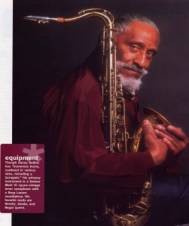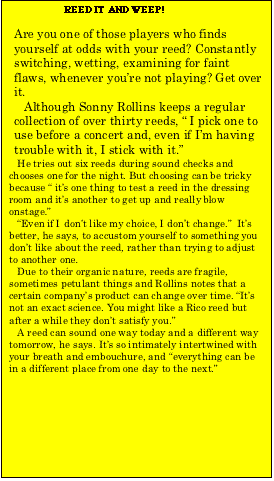Basking In A Sonny Day
Originally Published in Windplayer vol. 66
 Sonny Rollins was sitting in his high-rise apartment six blocks from the World Trade Center on that certain September morning. He heard the first plane fly in overhead and peered out the window because, as he recalls, “it sounded strange, flying so low.” He saw it hit the first tower.
Sonny Rollins was sitting in his high-rise apartment six blocks from the World Trade Center on that certain September morning. He heard the first plane fly in overhead and peered out the window because, as he recalls, “it sounded strange, flying so low.” He saw it hit the first tower.
He watched people running from the direction of the crash. “Men were shouting and women were crying,” he recalls. “It was crazy, like a Godzilla movie come to life.”
In the aftermath, he’s keeping his normally unguarded opinions on the state of our nation to himself these days, curbing his famous penchant for commenting during his concerts on everything from the economy to the environment.
“These days you have to be careful about what you say because any criticism can be considered un-American,” he says. “ I used to exhort my audiences about the dangers of global warming and pollution but I’m going to stop that now. We’re supposed to be upbeat so I’m just going to play my music and get off the stand.”
Not an easy task for a man as politically aware as the septuagenarian saxman who released an album in 1998 called Global Warming complete with spoken words:
We got to stop assumin’
We can just go on consumin’
Clean up the air, clean up the food,
Forget that arrogant attitude,
Live light on the planet, sister and brother,
‘Cause if we kill it, there ain’t no other,
Not that much time left neither,
“Global Warming” (Milestone)
“Music can be a salvation” in troubling times, he says. So instead of canceling a Boston concert scheduled the weekend after the tragedy, he got in a car and drove.
One of the last of his generation of Jazz musicians, Sonny Rollins has appeared on ninety albums, over sixty of them as a leader. He’s recorded with jazz greats like Dizzy Gillespie, Monk, Clifford Young, and Miles Davis. He even makes an appearance on the Rolling Stones’ Tattoo album.
These days he maintains a ‘reduced’ performing schedule of about thirty dates a year worldwide. “I’m one of the lucky ones who has more work than he can handle.”
Luck can be a factor, but it takes talent, determination, and sheer force of will to survive the jazz life, not to mention the music business itself. Born and raised in Harlem, in the late forties Sonny found himself part of a clique of future jazzmen who shaped the Bebop era and set the gold standard that, fifty years later, is still the sovereign sound of Jazz.
“The people I played with were instrumental in my development,” he says. “Bud Powell, Monk, Kenny Dorham, Miles, and, of course, Bird. It was a small group of guys and we not only played together, we lived, breathed, and bled together. There wasn’t that much money around, so it was all about the music. That’s what we lived for.”
The downside of that close-knit environment coupled with the hardships of the professional jazz life was the drug scene.
Like many young players, Sonny was influenced by the giants around him.
“Parker’s indulgence was well known, but before him there was Billie Holiday. Their drug use sent the wrong message to young musicians.”
Rollins says that Bird was dismayed to see young horn players following suit and tried to dissuade them from getting hooked as he had.
“I was lucky to escape with my life,” Sonny says of his own drug use, “and Bird helped straighten me out. He talked about it all the time, telling us that just because he was messed up on drugs, it’s not what he wanted for us.
“When I finally got myself together, Bird was the first person I wanted to tell. I went looking for him but it was too late – he had died.”
Rollin’s response to troubling personal challenges has been forthright and sometimes extreme. It’s a commonly known part of the Rollins legend that he has dropped out of the music business on at least two separate occasions. He moved to Chicago at one point and worked as a laborer while weaning himself from drugs, alcohol, even cigarettes.
But it wasn’t only addiction that drove him from the music business, At times, he just wanted to step away to work on his art. While on a self-imposed sabbatical in New York, every night he would walk to the middle of the Williamsburg Bridge and practice.
“I dropped out for different reasons at different times but the main thing was, I had a vision of what I wanted to become. I was able to turn off the world and go inside of myself.
“I took several sabbaticals, they were more about music than anything else. I wanted to get the things I heard in my head under my fingers. But it was all about self-improvement – music, quitting smoking, getting away from the excessive materialism of the business, trying to live a productive life. All of these things are essential to what I am and how I want to live.
“A person has to have high ideals, something to strive for. This was true in my musical life as well as my private life. I wanted to improve my music and improve myself. You have to have ideals and stick with them. If you have to drop out of the scene and go to the woodshed, that’s what you do.”
The Beatles are commonly credited with popularizing meditation, yoga, and all things Indian, but Rollins became interested many years before them. He began practicing yoga in the early sixties and spent four months in India. He also studied Zen meditation in Japan.
“Meditation is different for different people,” he says. “It’s not always sitting quietly. Practicing your instrument, putting your mind and soul into it, is a form of meditation too.”
“We’re told all the time how much we should get out of life – bigger cars and houses. That’s not what life is about. Your expectations should be on a more spiritual level, you need to have an economy about your life. What are we living for – to eat more Hagan Daz?”
Playing the tenor saxophone is a physical challenge for a person of any age. Rollins has maintained the necessary vigor to endure not only the playing, but the associated rigors that an international performing career entails.
“It’s proper to take care of your body”, he says, “we didn’t buy it, it’s a gift from your maker. Whether I played sax or not, I believe that. I try to eat properly and get as much exercise as possible.”
Which would explain why Rollins is still with us, when nearly all of his peers passed on long ago. Since then, Jazz has morphed into a legitimate art form, studied on college campuses by music students who major in Jazz as other students specialize in Baroque or Renaissance music.
“The opportunity wasn’t there to study Jazz in college in my day, so we learned by copying records, hanging around nightclubs, getting involved with small groups,” he recalls. “Now that Jazz has exploded into a worldwide phenomenon, it’s inevitable that it would be learned in a different setting simply because there isn’t the scene that was there when I was coming up.”
Not that every Jazz major is going to be able to make a living playing, but, as he says, “if you learn Jazz in school like you learn geometry, it gives you an appreciation and understanding of the music.” In other words, education creates an audience.
Rollins is aware that opportunities for young jazz players to make a living are limited, to say the least, mainly because Americans’ lack of exposure to the music.
“Where are the Jazz shows on television? There are none. My wife and I were watching television in Japan,” he recalls, “and there was a show consisting of two guys sitting at a table playing jazz records and talking about them. Simple set, just two guys sitting around talking about Jazz. They’d show pictures once in a while but that was it.
“It was a perfectly entertaining show and it made me wonder why we didn’t have something like this in America where Jazz was invented.”
Rollins sees this as a societal problem, with money and the music business at the root of the problem. Simply put, Jazz doesn’t sell because people don’t know about it and people don’t know about it because it doesn’t make money.
He feels that, in these days of instant communication and one-minute attention spans, Jazz has to be marketed correctly so people have a chance to hear it. You can’t appreciate something you never hear.
“There should be more backing, more Jazz on television, on NPR. The way it is now, if you put Jazz up against a bunch of young girls bumping and grinding on MTV, there’s no contest. And there shouldn’t be.
“Musical styles shouldn’t be either/or. Jazz shouldn’t be judged like other music. It’s more like classical music with an enduring sound that transcends time. It’s not about ‘who’s the latest singer’; today it’s Mariah Carey or Jennifer Lopez. Jazz isn’t like pop music in that sense but it still has all the energy, the life of now.
“What people don’t realize,” he says, “ is Jazz fits perfectly in our times. It’s alive, spontaneous, improvisation happens on the spot, right before your eyes. It’s very today.”
Rollins believes this American art form needs governmental interest to survive. “It’s not going to be done by the private sector because they’re only interested in making money.”
He notes that European governments subsidize Jazz, recognizing it for its intrinsic cultural value. “You need that kind of help for Jazz,” he says, “but these issues are political and complex.”
What about the argument that Jazz has lost its relevance, that after nearly a century of innovation and evolving styles, nothing new has happened in Jazz for the last twenty years? Rollins doesn’t see that as a problem.
“If I listen to Roy Eldridge or Teddy Wilson, it still has interest for me. I can listen to Louis Armstrong recorded in 1929 and get a kick out of it. It’s all great. And when people say Jazz hasn’t changed since the days of Charlie Parker, I don’t agree.”
A lot of this greatness is due to Rollins himself. Joshua Redman, one of the top young tenor players on the scene today, will be leading a week-long tribute, ‘Celebrating Sonny’, as part of the San Francisco Jazz Spring Season this April.
“Sonny Rollins is the reason I’m a jazz musician,” he says. “His playing awakened me to the power of improvisation. After hearing him, I realized that jazz improv could be spontaneous and immediate, yet also absolutely logical - completely in the moment yet structured and meaningful.”
Pianist/composer Herbie Hancock says simply, “Sonny Rollins is an icon.” He played with Rollins on several record dates and live concerts in the early sixties. “He’s a great player and a great composer, too.” He says. “Do you remember the movie, Alfie? He did the score and it’s a wonderful one.”
Innovator, icon, living legend - Sonny Rollins wears these mantles lightly as he plunges into the twenty-first century with the energy and enthusiasm of a man half his age.
“I’m fortunate that people still like to hear me play,” he says with characteristic understatement. Sonny, we’re the fortunate ones.
All Rights Reserved
Do Not Reprint Without Permission
